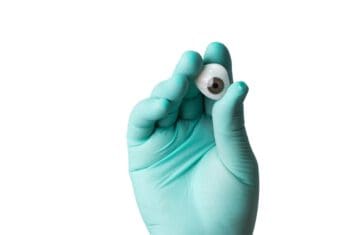Commonly Asked Questions About Prosthetic Eyes (Answered)
Home / Vision Education Center /
Last Updated:
If you have been in a recent accident, have eye cancer, or your eye is impaired, you may be a candidate for a prosthetic eye, known as a glass eye. Obtaining an ocular prosthesis can be a long process.
Properly caring for your new ocular prosthesis will help it last for a long time to come. Below are answers to common questions about prosthetic eyes.
Table of Contents
Why Is a Prosthetic Eye Needed?
Conditions like eye cancer may necessitate a prosthetic eye after treatment, especially if radiation therapy is used. Though treatments for eye cancer may prevent it from spreading to other parts of the body, side effects may include bleeding, loss of vision, dry eye, and problems with tear ducts.
Eye cancer is uncommon. It can either start in the eye (intraocular) or affect the outer parts of the eye. In some cases, it is necessary to remove the entire eye as part of treatment.
You deserve clear vision. We can help.
With 135+ locations and over 2.5 million procedures performed, our board-certified eye surgeons deliver results you can trust. Your journey to better vision starts here.

You may also need an ocular prosthesis if you have had a severe injury, infection, or painful blind eye.
What Are Artificial Eyes Made Of?
“Glass eyes” are not made out of glass today. Instead, they are implants that are spherical and made of medical-grade plastic acrylic.
What Is Eye Removal Surgery Like?
There are two kinds of eye surgery.
- Evisceration: This is less invasive, as only parts of the eye are removed, including the cornea and eye contents. Muscles and the white part (scleral shell) stay. This surgery is not right for everyone.
- Enucleation: This surgery is usually the best way to help patients who have more severe symptoms caused by cancer, injury, and infections. The entire eye is removed, and muscles are then sewn into the implant to assist with movement.
These surgeries are needed before you get your prosthetic eye. After these surgeries, a shell or clear plastic will be positioned behind your eye to prevent the eyelid from contracting.
What Can I Expect After Eye Removal Surgery?

Eye removal surgery is usually an outpatient procedure. You can often go home the same day.
It is common to feel pain in the affected area. Over-the-counter pain medications are helpful for most patients, but your doctor may give you a prescription for pain medication.
Swimming, exercise, lifting, and other demanding physical activities may be restricted for the next two to four weeks. You will have to take care of the bandage over your eye, and keep it on as long as your surgeon recommends.
Surgery can come with risks and side effects, such as drooping of the eyelid, infection, bleeding, and scarring. You may need to use special eye drops to deal with some of these side effects.
When Will I Get My Prosthetic Eye?
It may take six to ten weeks for swelling to go down. You will then visit your ocularist to be fitted for a prosthetic eye.
This will be placed in your eye socket about three to four months after you have healed from your eye removal surgery.
What Options Do I Have for Ordering a Prosthetic Eye?
You can buy an ocular prosthesis online. These are called stock shells and can be cheaper than a custom-fit prosthesis. However, stock shells do not always fit as well as a custom-made ocular prosthesis.
Are There Any Complications I Can Expect After Being Fitted for a Prosthetic Eye?

Your new prosthetic eye may feel uncomfortable or tight. You may also have some discharge during use, especially during cold weather. If you work in a place that is dusty, you can expect a bit more discharge than usual.
You deserve clear vision. We can help.
With 135+ locations and over 2.5 million procedures performed, our board-certified eye surgeons deliver results you can trust. Your journey to better vision starts here.
How Do I Move my Eyes?
Your doctor will connect your implant to your muscles to facilitate movement using eye tissue. This will let you move your eye in a more natural manner, but a prosthetic eye will not always move as much as a natural eye.
How Long Will My Prosthetic Eye Last?
The average life of a prosthetic eye is five years, according to the American Society of Ocularists. You can prolong your artificial eye’s life by many years with regular care and cleaning. But how long you can wear your prosthetic without needing a replacement depends on how well you care for it and several other factors.
In some patients, the prosthetic may lose its original fit with time, causing them discomfort as well as cosmetic concerns. In others, the marble-like implant may move from its original position in the eye socket, causing the prosthetic to recede.
You may need to replace your artificial eye earlier than normal if you experience such poor fit issues. As for minors with prosthetic eyes, replacements or modifications are often necessary to accommodate their eye sockets’ natural growth.
How Long Can I Wear My Eye?
An artificial eye is a full-time quality of life enhancement and there’s usually no reason to remove it at any time, except during regular maintenance and care. If your child wears one, discourage them from ever removing it.
Generally, it’s OK to wear your eye all the time, removing it only when you visit your ocularist for a checkup. Your doctor likely will want to see at least once a year and possibly twice a year.

What Is the Right Way to Clean My Prosthetic Eye?
To remove your eye to clean it, do so in front of a mirror and use a towel in case the eye falls. This will prevent it from breaking or becoming damaged.
Next, pull the lower part of your eyelid downward. You should be able to see the edge of the prosthesis and use the extractor to remove the eye.
Boil water and allow it to cool. Then use a tissue or gauze soaked in this water to clean any discharge around your eye or eyelashes. Use unscented soap and warm water to clean the eye, and then sterilize it again use the boiled cool water from before.
Disinfectants, detergents, and chemical-laden soaps may ruin your prosthetic eye. Avoid these.
How Often Should I Clean My Eye?
It’s important to wear a clean prosthetic to protect the health of your eye socket. If you feel comfortable with the process, you can remove your false eye for cleaning every one to three months.
In addition, have your ocularist polish your prosthetic at least once a year. Professional polishing isn’t optional: It’s designed to remove harmful bacteria and other debris from the surface of the artificial eye.
How Often Should I Get a Checkup for My Eye?
It is best to check on your eye’s health every 12 to 18 months. This allows doctors to monitor wear and tear, and give your eye a professional clean and polish.
You will notice that after about a year, or even a few months, your eye may even produce more discharge, signifying that should get your eye checked soon.

What Is the Cost of a Prosthetic Eye?
This can vary depending on which clinic you use to obtain the ocular prosthesis. Things can affect the cost of a prosthetic eye are your location, the way the doctor designs your eye, and the prior condition of your natural eye. A digital design is likely to be cheaper.
Complicated surgeries and aftercare are likely to drive up the cost of your prosthetic eye. After surgery, medical costs, and properly fitting a prosthetic eye, you can expect to spend several thousands of dollars.
Does Insurance Covers Prosthetic Eyes?
Medicare Part B does cover prosthetic eyes, but you will need a doctor’s prescription for this procedure—and probably a pre-approval from your insurance carrier—to qualify for coverage.
You deserve clear vision. We can help.
With 135+ locations and over 2.5 million procedures performed, our board-certified eye surgeons deliver results you can trust. Your journey to better vision starts here.
References
- Radiation Therapy for Eye Cancer. (November 2018). American Cancer Society.
- Eye Cancer. (August 2016). MedlinePlus.
- Eye Melanoma. (September 2018). Mayo Clinic.
- Eye Removal Surgery: Enucleation and Evisceration. (June 2019). American Academy of Ophthalmology.
- Prosthetic Rehabilitation of an Ocular Defect With Post-Enucleation Socket Syndrome: A Case Report. (January 2014). Saudi Dental Journal.
- Everything You Need to Know About Having a Prosthetic Eye. (May 2018). Healthline.
- How to Take Care of Artificial Eyes. (April 2014). Newsmax.
- Custom-Made Ocular Prosthesis. (August 2012). Journal of Pharmacy and Bioallied Science.
- Is My Test, Item, or Service Covered? (2019). Medicare.gov.
- Artificial Eye Care. National Artificial Eye Service.
This content is for informational purposes only. It may have been reviewed by a licensed physician, but is not intended to serve as a substitute for professional medical advice. Always consult your healthcare provider with any health concerns. For more, read our Privacy Policy and Editorial Policy.